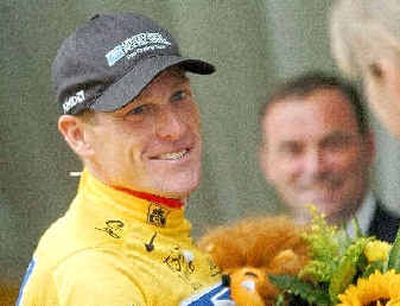The chase is on

ARRAS, France — It’s the jersey Lance Armstrong covets and works so hard for: garish yellow and awarded daily to the leader of the Tour de France.
Armstrong slipped into the jersey Wednesday for the first time at this Tour after he and his team won a rain-soaked time trial. Then the five-time champion said he’s ready to surrender the cherished shirt — at least temporarily.
The reason? Because defending the lead at this early stage of the three-week race would be too grueling. For Armstrong, there’s just one place where wearing yellow really counts: at the finish on the Champs-ElysDees in Paris on July 25.
That would be Armstrong’s sixth crown, a record in the 101-year-old race. The Texan took a big step toward that goal in Wednesday’s team event, opening up important but not insurmountable time gaps over key rivals.
From here on, Armstrong will try to prevent them from recovering the lost ground, and even look to extend his advantage when the Tour climbs into the Pyrenees at the end of week two, followed by the Alps.
But Armstrong’s team can’t keep tabs on all 183 riders still in the race. As long as key challengers don’t zoom ahead, Armstrong indicated he won’t exhaust his teammates by making them chase down breakaways by second-tier riders at this stage — even if their efforts earn them the yellow jersey for a day or two.
“This is a hard race to defend,” the 32-year-old Armstrong said. “We’re not going to sacrifice the team to defend the yellow jersey in the north of France. The time to work and defend begins in the Pyrenees.”
Last year, Armstrong’s team surrendered the jersey to a French rider, Richard Virenque, for a day. Armstrong took the lead in the next Alpine stage and then wore yellow all the way to Paris — 13 racing days in all.
With Wednesday’s win, Armstrong has earned 60 jerseys in his Tour career, including five as champion. But, “I don’t really think about those things,” he said.
“The only real yellow jerseys that matter are the ones that the guy wears on the Champs-ElysDees.”
Were it not for new rules, Armstrong’s squad could have done far more damage to rivals in Wednesday’s race against the clock. His U.S. Postal Service squad, driven on by Armstrong yelling encouragement, dominated the very technical event. He relished the ride.
“I was just smiling on the bike. It was like a dream,” he said.
Armstrong’s overall lead was 10 seconds, but the next four spots on the leader board were occupied by his teammates. The closest non-team member was Spain’s Jose Enrique Gutierrez, who was 27 seconds behind in sixth place.
Gutierrez rides for Phonak Hearing Systems, the same team as Armstrong’s American rival Tyler Hamilton, who was 36 seconds behind.
As a team, Phonak trailed by 1 minute, 7 seconds, but because of the new regulations that limit the advantage gained by the winners, Hamilton lost just 20 seconds to Armstrong overall.
The T-Mobile squad of Armstrong’s most feared challenger, 1997 Tour winner Jan Ullrich of Germany, finished fourth, 1 minute, 19 seconds back. But Ullrich’s loss was cut to 40 seconds by the rule change.
Still, Armstrong said, “20 seconds or 40 seconds is a significant amount of time.”
Organizers introduced the new rules to ensure that strong riders in weak squads weren’t left too far behind by the team event, killing their overall chances and dulling suspense in the Tour early on.
“That’s the rules and I can’t change them,” Armstrong said. “At least you have the consolation of knowing that your team was very strong.”
Clad in blue, Armstrong and his teammates took turns at the front of their line along the 40-mile course from Cambrai to Arras.
They started slowly, coming through in fifth place at the first time check, but then picked up speed. Despite wet roads, they clocked an average speed of 33.3 mph — the third-fastest ever. They celebrated with hugs, and squad veteran George Hincapie gave a thumbs-up.
“It really was a special day,” Armstrong said. “The team was incredible. The rhythm was perfect.”